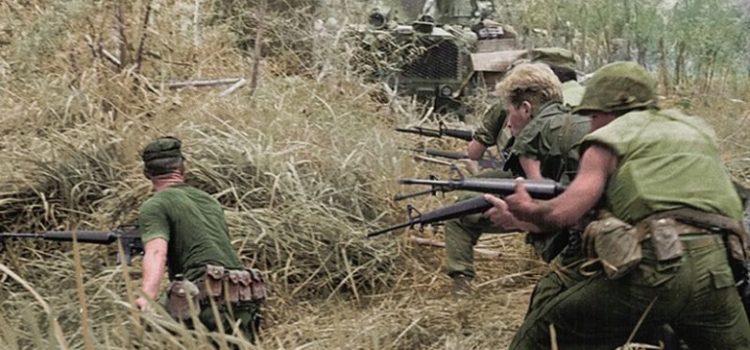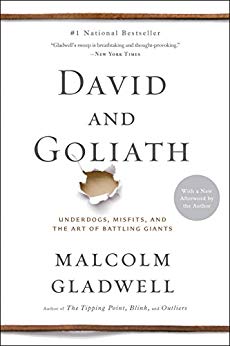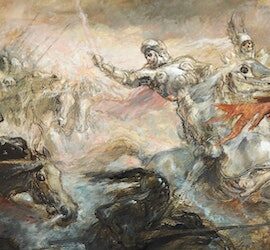

This article is an excerpt from the Shortform summary of "David and Goliath" by Malcolm Gladwell. Shortform has the world's best summaries of books you should be reading.
Like this article? Sign up for a free trial here .
Who was Konrad Kellen? And is it possible that he could have shortened the Vietnam War?
Konrad Kellen was a German political analyst who served in various roles, including U.S. Army Intelligence, during his long career.
Learn what Konrad Kellen knew about the Viet Cong and the Vietnamese people that could have ended the Vietnam War earlier and saved many lives…if only the U.S. government had taken his opinion seriously.
What Konrad Kellen Knew: Davids Beat Goliaths
Although we think of underdog victories as anomalies, Konrad Kellen knew that the less powerful side often beats the more powerful side. He knew that the Goliath of the Vietnam War, the U.S. government, probably wouldn’t beat the Davids, the Viet Cong. Before we look at how Konrad Kellen knew this, let’s look at the question generally: If Davids beat Goliaths all the time, why hasn’t that changed the way we view “David and Goliath” situations?
- It’s counter-intuitive. The assumption that the bigger, stronger, wealthier, more weaponized side has to win is instinctive and goes against conventional wisdom. It’s hard to wrap your head around the idea that the victory of a small, weaponless shepherd boy over an experienced, armored giant is not only possible but probable.
- It’s easiest to measure advantage by what we can see: the number of soldiers, the amount of money, the available weapons and material resources. It’s harder to look below the surface to evaluate the less tangible or clear-cut advantages of disagreeability, deficiency, and trauma. Furthermore, disagreeability, deficiency, and trauma are painful. We’re wired to link pain with disadvantage, so we don’t as readily see pain’s advantages.
Konrad Kellen v. Leon Gouré
During the Vietnam War, there were two general opposing views. Leon Gouré was certain the U.S. military (Goliath) would be victorious over the Viet Cong (David); Konrad Kellen was certain the U.S. military would never suppress the Viet Cong. Konrad Kellen was right, but by the time the American government realized it, more than a million soldiers and civilians were dead and America was in turmoil.
In the 1950s, communists, backed by the Chinese, controlled North Vietnam, and a pro-Western government ran South Vietnam. The U.S. decided to send troops to help the South defend itself against communism and its North Vietnamese agents, the Viet Cong.
The plan, called Operation Rolling Thunder, was to bomb Viet Cong-controlled areas until the North gave in. The U.S. government was confident—as they saw it, they had all the advantages, the “three M’s: men, money, and matériel,” as one general put it.
The Morale Project
There was really only one problem: The U.S. didn’t know anything about its enemy, the Viet Cong.
Leon Gouré worked for the RAND Corporation, which developed the Morale Project. Its goal was to understand the motivations of people who joined the Viet Cong. For the project, dozens of researchers interviewed people who had defected from the Viet Cong or were captured current members. Because so few people showed an interest in hearing their stories, the subjects were often very willing to talk.
Gouré’s Interpretation of the Morale Project Evidence
Gouré, who read all the interview transcripts, told military and government officials that American bombing was making a huge difference in the conflict. He said that many people were defecting from the Viet Cong and that civilians in the countryside welcomed U.S. involvement in the region.
Gouré had evidence to support this interpretation: The number of defectors who thought the Viet Cong would win the war decreased from 65% to 20% after a year of increased U.S. bombing.
Gouré filtered the evidence through a military logic that said that a miniscule country with no resources had to succumb to the most powerful country in the world dropping 643,000 tons of bombs on its people and countryside.
Gouré’s takeaway: Even Northerners don’t think the Viet Cong will win the war. The Viet Cong will give up and the U.S. will win.
Konrad Kellen’s interpretation of the Morale Project evidence
Late in 1966, the RAND Corporation asked Konrad Kellen, who had previously served in U.S. Army Intelligence, to read and analyze the interview transcripts from the Morale Project and report back.
Konrad Kellen saw the same data, but interpreted that data through a different lens and reached a totally different conclusion. He took note of subtleties like those in interviews by Mai Elliott, who found that interviewees were actually defiant.
These subjects had sacrificed their lives for their ideals of reunifying Vietnam and getting rid of the Americans. One woman Elliott interviewed had been forced out of her home by Americans who suspected her village of being controlled by the Viet Cong. The Americans then required her to help build her new village. She hadn’t been a member of the Viet Cong when Americans arrived, but the Americans treated her badly, forcing her into the Viet Cong’s waiting arms.
Many of the Viet Cong insurgents were poor and disillusioned by the West’s “help.” Their lands had been bombed and they had few material possessions. They had the freedom of having nothing to lose.
Near and Remote Misses
Konrad Kellen intuitively understood the distinction between “near misses” and “remote misses.”
- Near miss: You’re a civilian. An American bomb leaves you badly injured and demoralized. You don’t have the energy or health to fight. You give up.
- Remote miss: You’re a civilian. An American bomb destroys your home and kills your family members, but you emerge unscathed (at least physically). This experience fosters so much hate of Americans and their allies in the South that you vow to never stop fighting.
Although Konrad Kellen saw the same statistics as Gouré—that only 20% of defectors thought the Viet Cong would win the war—he saw something Gouré didn’t: Defectors didn’t think the U.S. would win, either. In other words, “80% of defectors did not think the Viet Cong would win the war” does not mean “80% of defectors think the US would win the war.” Gouré had jumped to his own favorite conclusion.
The Viet Cong were indifferent to winning or losing. They were merely concerned with fighting. How do you conquer an enemy who doesn’t care if he wins or loses?
Konrad Kellen’s takeaway: Northerners don’t think there will be a winner in this conflict. The Viet Cong will never give up. Consequently, after spending hundreds of billions of dollars and sacrificing the lives of thousands of soldiers, the U.S. will be the loser in this conflict.
Konrad Kellen and his interpretation of the Morale Project transcripts were largely ignored by the White House and military officials.
What he was saying diverged too greatly from the common sense of American might. It might always be hard to believe that a small shepherd boy could conquer a giant.
———End of Preview———

Like what you just read? Read the rest of the world's best summary of "David and Goliath" at Shortform . Learn the book's critical concepts in 20 minutes or less .
Here's what you'll find in our full David and Goliath summary :
- Why being the underdog can actually be an advantage
- Why you shouldn't be afraid of powerful giants
- Strategies to get an edge when you're overpowered






